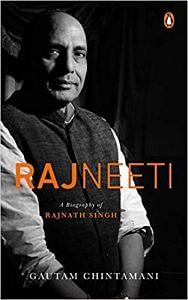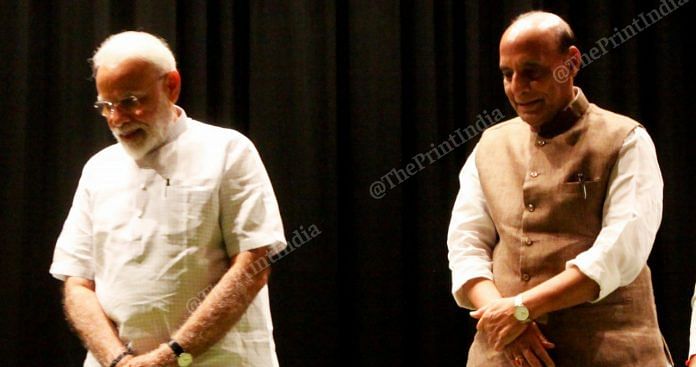In a matter of weeks since taking over, Rajnath Singh could see that the thought of Narendra Modi leading the BJP was taking a concrete shape among the party cadre. As a realist, however, Singh also got the sense that pitching Modi would not be easy as more than allies on the outside, there appeared to be enough opposition inside the BJP.
Singh’s ability to get people with opposing ideas on the same page and his steadfast dedication to not letting disagreements fester for long was put through the toughest of tests. The first indication Singh got that all was not hunky-dory was when some senior leaders, including L.K. Advani, decided to skip the party’s June 2013 national executive in Panaji, Goa. The possibility of Narendra Modi being given a greater responsibility for the 2014 elections, if not being named as the party’s prime ministerial candidate, was, apparently, enough to make Advani, Yashwant Sinha, Jaswant Singh, B.C. Khanduri and a few more, including Uma Bharti, Ravi Shankar Prasad and Varun Gandhi, give the event a miss. This made it abundantly clear what an uphill task it would be to get the leadership to jointly put their weight behind a single candidate.
The rousing welcome that Modi received upon his arrival, which also included a public announcement of support by Goa chief minister Manohar Parrikar, set the tone for the meeting. Singh had been in constant consultations with the top brass but some of the opposition to any formal announcement regarding Modi was too conspicuous to disregard. If on the one hand, before arriving in Goa, Singh heard about BJP members hinting at possible names to the media, on the other, he got calls from allies who wanted to know what was on his mind. Nitish Kumar of the JD (U) had made his reservations about Modi being projected as the BJP’s prime ministerial candidate quite clear and asked Singh if the party was going to make it public in Goa.
Also read: Modi’s one move showed Rajnath Singh’s 44 years of politics can become ineffective in a day
Singh told Kumar that the CPB would assign some extra responsibilities to Modi, but no final call had been taken yet. Kumar was not convinced and attempted to dissuade Singh from declaring Modi as the party’s candidate.
During the two-day national executive, there were whispers about a clear opposition towards Modi emanating from, primarily, what the press had dubbed ‘Team Advani’. This was the first time in over five decades that Advani had not attended a key meeting of the political outfit that he had been a part of, but he was consulted by the PCB as well as Singh on the final decision. There were reports about the grand old man of the party not too keen on announcing Modi’s name as the head of the campaign for the general elections right away.
It was inevitable that the absence of some of the key members of the CPB would lead to a delay in arriving at a consensus for the ‘bigger’ announcement—Modi as the BJP’s prime ministerial candidate—but going back from Goa without any conclusion would send out the wrong message. Looking at the manner in which some quarters were opposed to his name and privy to the constant back-room chatter about moves to scuttle his appointment, Narendra Modi thought of opting out.
Having worked alongside for many years, both Singh and Modi had found in each other the perfect sounding boards.
Singh had been witness to Modi’s work as the chief minister of Gujarat and was also aware of his immense popularity amongst the cadre.
During the final discussions at Panaji, Singh’s resolve only strengthened. Even in the face of overwhelming opposition, he dug his heels in. As Singh reasoned with the entire gamut of the leadership, irrespective of age and experience, he underlined how any deferring of an announcement would take away the tactical advantage that the party would have over others. But more than anything else, the lack of clarity could dampen the spirits of the cadre.
Also read: How many times can you invoke Modi’s name in a speech? Ask Sushma Swaraj & Rajnath Singh
Personally, Singh always adhered to the voice of what he considered his dharma and, as party president, his first and foremost responsibility was to pick a candidate who could deliver victory. Singh was the last person to speak on the final day of the executive meet and, as he rose to address the gathering, there was nothing on the agenda that indicated any ‘major’ announcement. In his twenty-five-minute-long address, Singh sounded the clarion call. He expressed his desire to start a central booth management committee to facilitate better coordination with the electorate across every single booth in the country. As his address drew to an end, Singh repeated that the leaders of the party might have differences of opinions but it would be impossible to find such large-hearted leaders elsewhere.
Keeping in mind the challenge of the biggest elections known to man, Singh proposed the creation of a central campaign committee and then, without much ado, announced Narendra Modi as its chairman.
In the midst of thunderous applause that took a while to die, Singh said that people would inevitably ask, ‘Kyon kar diya aap ne’ (Why did you do it?), ‘Kya hai?’ (What was that?). The answer to that was clear. There was no dearth of able leaders in the party. However, the manner in which Modi had not only won the elections three times in a row but also established a new parameter of development in the state which was acknowledged globally had led the party to repose its faith and hope in Modi.
The announcement was so unexpected that there was no bouquet to felicitate Modi with. So, Singh picked up one lying next to the lectern, which had been given to someone else before, and handed it to him.
The next day, at a meeting where Singh, along with Arun Jaitley, Manohar Parrikar and Narendra Modi were interacting with party workers from Goa, Singh broke protocol and opted to speak before the others.
He told the gathered workers that the reason he had got up to speak before Modi, who had been invited to deliver his address by Jaitley, was simply that he did not want to come between them and the yuva neta (young leader) whom they had come to hear. He asked them to get ready for a decisive election up ahead and welcomed Modi to address them. Rajnath Singh’s unexpected and terse announcement was signal enough of what lay ahead. The manner in which one of the most significant developments of the 2014 Lok Sabha elections—that could possibly change its course—was handled also indicated the massive opposition he faced. Singh’s last moment announcement was seen as bringing Narendra Modi one step closer to being made the party’s prime ministerial candidate.
Also read: Who has groomed BJP’s future leaders better: Vajpayee-Advani or Modi-Shah?
The announcement had its repercussions. Nitish Kumar called Rajnath Singh to inform him that the JD (U) had made up its mind to leave the NDA after a seventeen-year-old alliance. Singh mentioned that nothing had been announced barring Modi given the charge of managing the elections, but for Nitish Kumar, everything was crystal clear the moment Singh had called Modi the leader.
It was nearly three months before Narendra Modi was finally announced the BJP’s prime ministerial candidate. On 13 September 2013, the party’s CPB in New Delhi unanimously elected the Gujarat CM as the one to lead them in the Lok Sabha elections. Barring L.K. Advani, who skipped it expressing anguish about the way the party was functioning, the meeting was attended by every other member of the twelve-member board. It is to Singh’s credit that nearly all the opposition towards Modi just a few months ago was a thing of the past.
 This excerpt from Rajneeti: A Biography of Rajnath Singh by Gautam Chintamani has been published with permission from Penguin Random House India.
This excerpt from Rajneeti: A Biography of Rajnath Singh by Gautam Chintamani has been published with permission from Penguin Random House India.




After a lifetime in politics and the Jan Sangh / BJP, Shri L K Advani was the last person to read the writing on the wall. So blinded by personal ambition.